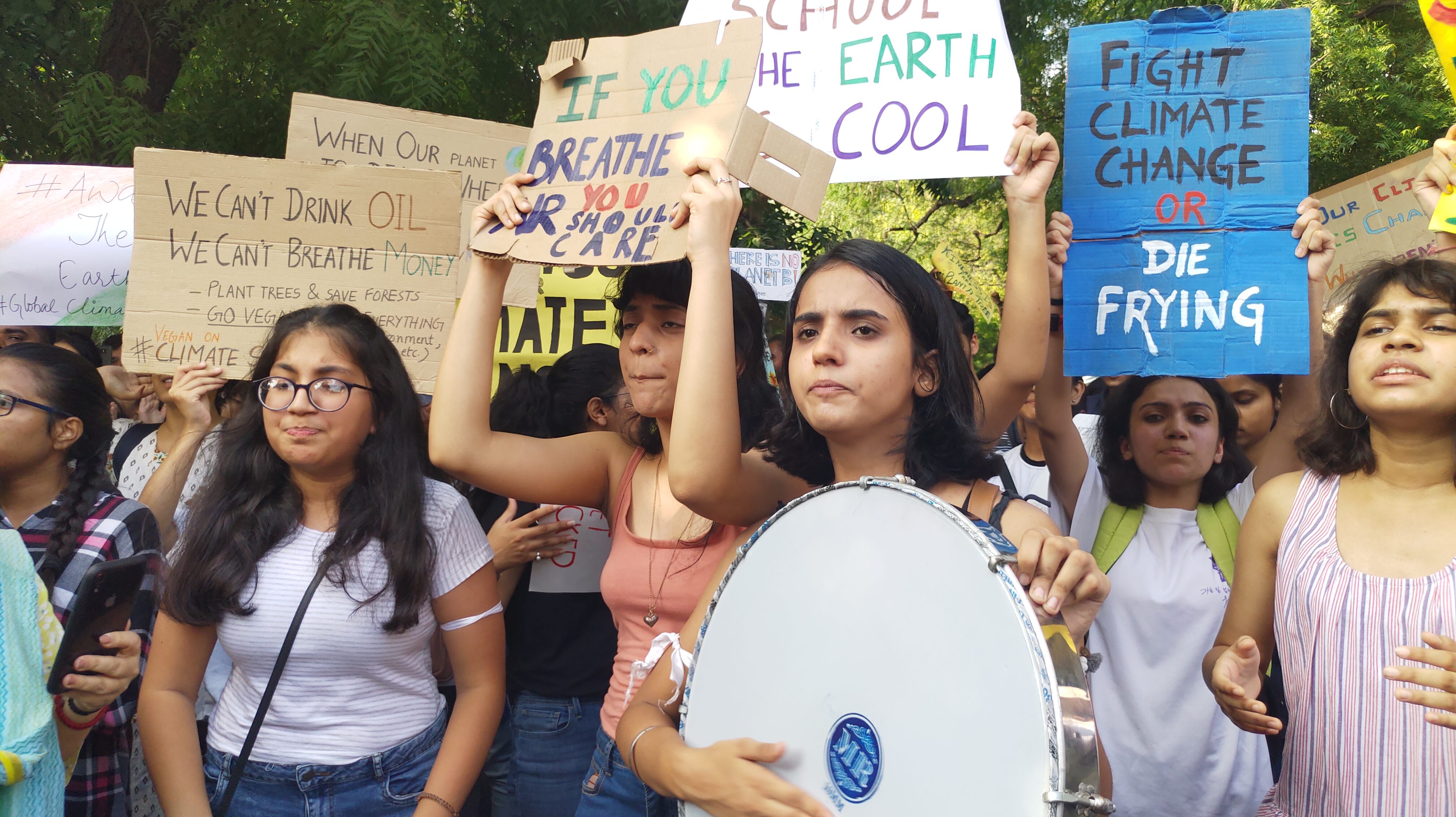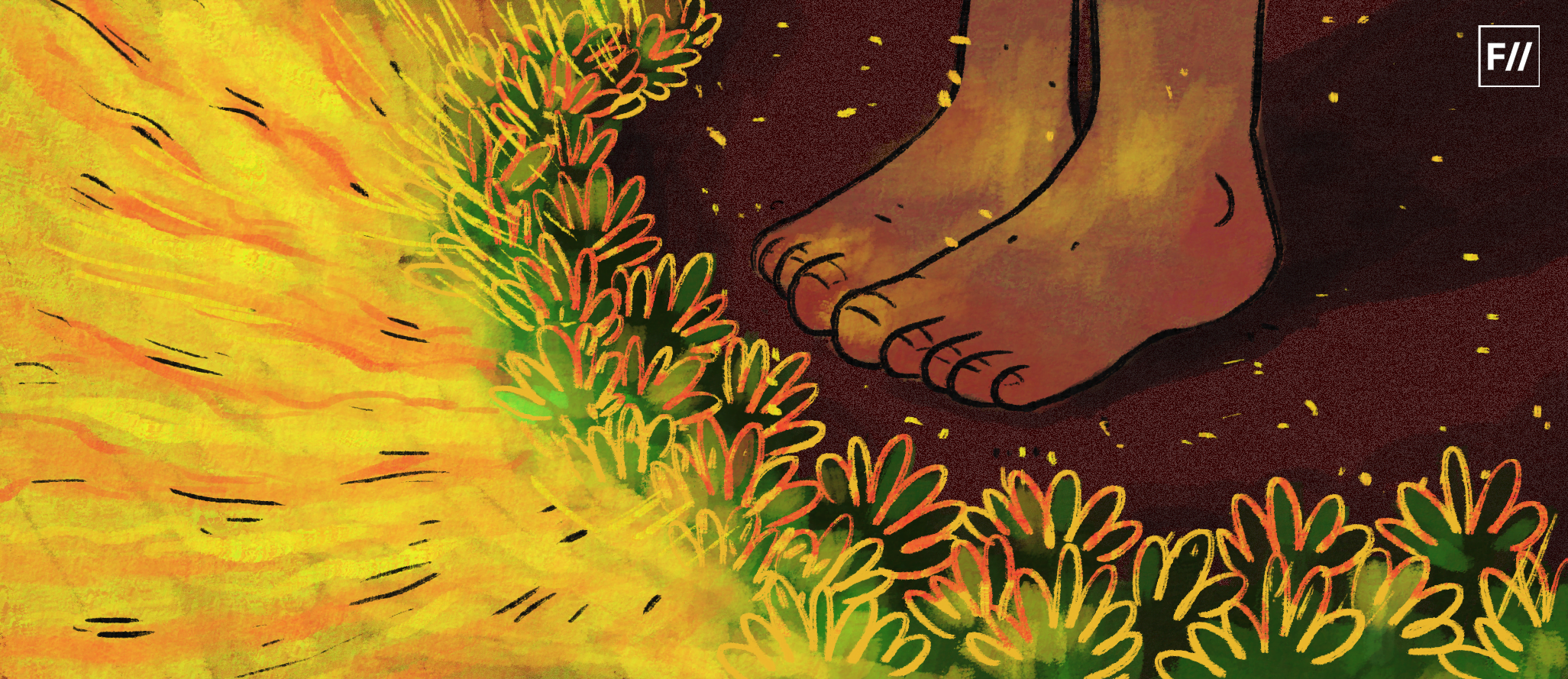There’s a hubbub right in front of Nirman Bhawan in Delhi’s Central Secretariat Area. Government employees who frequent the tea stalls nearby are used to sipping their morning tea in quiet repose, which is why they can’t seem to understand the other side of the road being all abuzz. As the onlookers roll the windows of their cars down and the police try to keep the crowd off the road, everybody appears to be asking the same question, “What on earth is happening?” Two young children come to the rescue, their small hands gripping onto their signs tightly, their strong voice booming with the crowd’s, telling us all, “There’s no Earth B!” The September 20 Global Climate Strike in Delhi kicks off with a roar.
Apart from the odd parent out and the teachers escorting their students, the crowd predominantly consists of young people. School children from various schools in Delhi-NCR zealously demand Climate Justice at once. College students too have skipped classes to be here today. “I have skipped college today, yes,” says Sakshi Grover, a student of Delhi University. Why?- you might ask the 18-year-old. “Because this is crisis, this is need of the hour.”
When the Swedish teenage environmental activist Greta Thunberg had started skipping school every Friday to demonstrate in front of the Swedish Parliament, holding a sign that said “School strike for the climate”, little would she have known that she would be the reason why millions of children would be on the streets on 20th September, demanding immediate action to fight climate change from their governments- making it possibly the largest climate strike in the history of the world. More than 14,000 people took to the roads in strikes planned all over India. A number which doesn’t seem too impressive when we look at the turnout in cities like Sydney, Berlin, and Cologne, but impressive nonetheless.

The Delhi chapter of the strikes is unique- with two different strikes planned at two different hours. While the morning strikes at the Ministry of Housing and Urban Affairs gets somewhat subdued by the crowd being pushed on to the pavement and asked to not to be “too loud”, the turnout at Lodhi Garden under the raging sun at 3 pm is surprisingly massive, “We are unstoppable, another world is possible”– nearly 2,000 young people let us know. They are marching to the Ministry of Environment, Forest and Climate Change on Jor Bagh Road to speak to Mr Prakash Javadekar. “A climate emergency has to be declared by the Prime Minister”– This is on top of the agenda. These young students haven’t forgotten the Niti Aayog’s prediction of 21 major cities running out of drinking water by 2020, and they certainly haven’t forgotten that nine out of the world’s ten most polluted cities are in India.
But what difference does striking make? “Striking makes a difference,” says 15-year-old Manya Anandi, a student of Shri Ram School, Aravali. “Striking will get the attention of the people in power, the people who can make these policies, who can help us curb these issues- striking will get their attention and striking will tell them that we will not sit quietly while the bigger companies choose profit over people.” Grover too, believes that striking ‘definitely’ makes a difference, “I think what this does is target the mentality of people towards this, their casual attitude of buying plastic, throwing plastic. They need to understand that this is an issue and this is an issue now.” The strikes indeed have pushed climate change as the topmost agenda in global politics, brought about the much-needed urgency that was missing from the conversation around climate change- so yes, they do make a difference, a very significant one, to say the least.
The strikes indeed have pushed climate change as the topmost agenda in global politics, brought about the much-needed urgency that was missing from the conversation around climate change- so yes, they do make a difference, a very significant one, to say the least.
Apart from organisations like Extinction Rebellion and Fridays For Future, Delhi, several other activists and civil society members participate in the strike. Rinzin, from Students for a Free Tibet- India, a nonprofit student’s organisation based in Dharamshala, explains why she is at the strike, “Whenever we talk about climate change or the issue of global warming, it’s not restricted to few cultures. We hail from Tibet, the highest plateau on Earth and whenever there’s discussion on climate change, Tibet is sadly underacknowledged. It is hardly discussed.” She underlines how Tibetans are seeking Climate Justice too, “Tibet is also the water tower of Asia, and it’s sad that Tibet is not brought on the table when we discuss climate change, so that’s what we are here to highlight. And also to show our solidarity and support the other strikers here. There’s unchecked mining, deforestation- and all of this is happening all over the world- not just in Tibet. So that’s why we are here.”

It’s not just Tibet that is amiss from the table. Where do you find discussions on sustainability that are truly intersectional? Are we willing to acknowledge that we have very conveniently cut out Indigenous people and their struggles from the mainstream narrative of action against climate change? Anubhuti Rabha, a student of Lady Sri Ram College, who is a tribal woman from Assam, is quick to correct me.
“I’m so glad the mainstream people are starting to wake up, but at some level, I find it offensive to put it this way- “How to include Indigenous people into the mainstream movement?” Because this is the indigenous people’s fight, this has been their fight. I feel like the elite has again coopted and made it their cause now, but this has been the cause of Indigenous people forever. We have to now see how the people who have the privilege help them, and not be like- ‘it is our thing and you come and join us’. We have to help them out- they have already led the way. They have done all the groundwork. We just have to follow their steps and maybe just show solidarity. Not take up space. Just be silent and stand with them as allies. That’s it.”
The Global Climate Strikes will continue between September 20 and September 27 all over the world as the United Nations General Assembly meets in New York.
Also read: How To Travel Without Expanding Your Ecological Footprint
She points out how the exploitation of Indigenous rights isn’t just limited to India. “The term Adivasi, anyone with any Sanskrit or Hindi familiarity will know what it means. ‘Adi’ means old, and ‘Vasi’ means inhabitants. Adivasi erasure has happened with Aboriginal people in Australia, Native Americans in America. The way the State functions is by erasing these identities. As if they are invisible. As if they don’t exist. But they are very much there, in flesh and blood. And their struggles are very real.”
“Are we there yet?” Two young girls ask me. “We’re very close”, I tell them. But the barricades put up by the police some 50 steps away from the Ministry shows us that we aren’t. News of the impromptu sit-in does reach the Ministry. We hope our voices do too. Five people are invited to the Paryavaran Bhawan. They return and tell the crowd that Mr Javadekar isn’t in town, instead Geeta Menon, Joint Secretary at the Ministry, took note of the protest but failed to give a strong word on “what will happen”. No one from the Ministry comes out to address the crowd. But everyone is far from being discouraged. They make a solemn vow to come here every Friday, and bring more people with them.
The Delhi Climate Strike concludes with a roar too, the spirits as high as they were in the morning. There is no hesitation in the voices chanting “Azaadi. Azaadi. Pradushan se Azaadi. Hum le kar rahenge Azaadi” one last time before everyone goes home. Greta Thunberg address to a rally in New York echoes the same sentiment, “This is only the beginning. Change is coming whether they like it or not.”
Also read: Is The Water Crisis In India The Beginning Of Climate Breakdown?
The Global Climate Strikes will continue between September 20 and September 27 all over the world as the United Nations General Assembly meets in New York. On September 23, the 2019 UN Climate Action Summit will be held at United Nations Headquarters in New York.
All pictures have been provided by the author herself.
About the author(s)
Purnima is a wannabe writer and a want-to-be cat mom.




